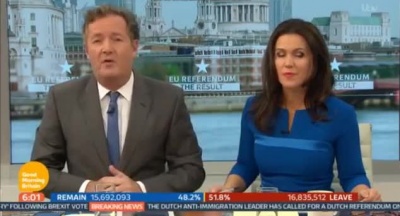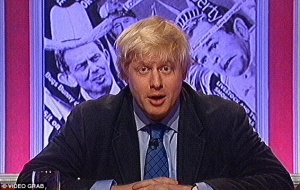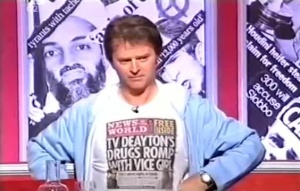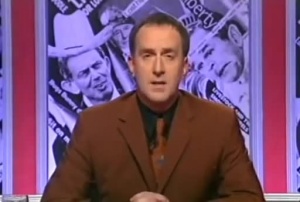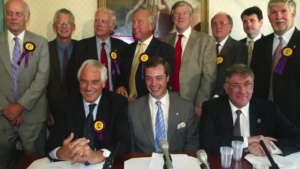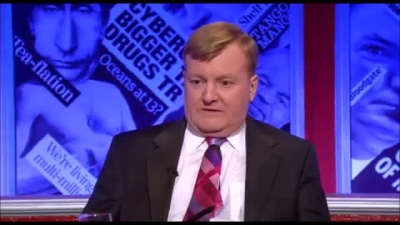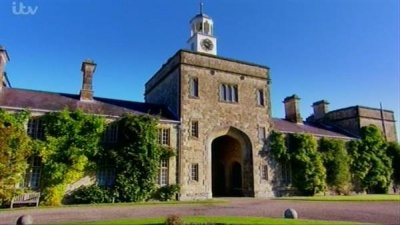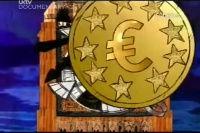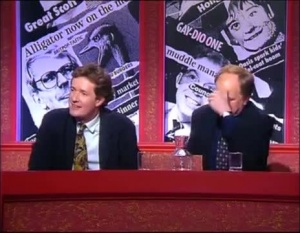Weaver's Week 2016-07-10
Last week | Weaver's Week Index | Next week
"Wow. Just, wow." The Good Morning Britain host was at his eloquent best the other Friday morning.
History is happening now. Some of the best wordsmiths in the land were crafting summaries for the ages, improvised blank verse live on national television. These soliloquies could capture the mood of the world, and tell us something about the speaker's talents.
In the weeks afterwards, many questions have been asked. One such question has relevance to this column.
Contents |
What if Angus Deayton hadn't been unseated?
The theory goes like this. Angus Deayton was fired as host of Have I Got News for You in October 2002. In the years afterwards, Boris Johnson had memorable turns as the show's host. These appearances turned him into a star. They propelled him to the Mayor of London, then back into Westminster, where he led the campaign for a "Leave" vote. And then Boris went on to where he is today.
Boris Johnson used HIGNFY as a stepping stone. Back in 2005, Matthew Rudd noted,
- It definitely feels like there is a Muhammad Ali effect when Boris Johnson is due to appear on HIGNFY. Michael Parkinson always said he had the same number of people watching his talk show week on week, year on year, except when Ali was booked, then it would rocket. Something about Johnson's befuddled performances (not that the man is anything but a master craftsman who knows that being supposedly ignorant does his public image the power of good) makes people alter their social plans for Friday nights when he's due on. More videos get set too.
Boris Johnson began his career at The Times. They fired him for making up a quote. He moved to the Daily Telegraph, where he was Brussels correspondent. In that role, he fed the paper all sorts of made-up nonsense, his editors printed the falsehoods with reckless disregard to the truth. Rising almost without a trace, Johnson moved to The Spectator, where he became editor in 1999 – after his debut on HIGNFY. Johnson was elected to the Commons in 2001.
Angus Deayton had become front page news in May 2002, after someone had tattled on him sharing coke with a prostitute. Further revelations in October meant that Deayton could be barracked by Christine Hamilton. Her husband Neil had been drummed out of parliament after appearing to accept cash for asking questions. "If [Neil] is disgraced, what are you?" barked Christine Hamilton.
"Disgraced," said Deayton with a nod to the audience. They approved of him. The BBC1 controller, Lorraine Heggessy, did not, and appeared to lean on HIGNFY producers Hat Trick. Deayton was fired, and the rest is history.
But history isn't a fixed thing. With modern technology we can travel forwards and backwards, seeing what would have happened with different decisions. For this analysis, we confine ourselves to the Incompetent Men Theory of History, single decisions taken by identifiable people at a clear moment. With all the time-travelling ability of Isambard Kingkong Brunel (or Bill and Ted, for older readers), we're going to chimp about with time.
What would have happened if Deayton remained with HIGNFY?
The storm would have blown over, it always does. After a series as the butt of everyone's jokes, Deayton resumes in April 2003.
We can see trouble ahead for HIGNFY. Under Angus Deayton's chairmanship, HIGNFY was acerbic. Satirical. Cutting. It spoke truth to power.
But fabricated "scandals" elsewhere in the BBC made it more difficult to say the awkward truth. The BBC's culture changed after the Hutton "inquiry" of 2004, then the Russell Brand "phone call" of 2008. Would these still have clipped HIGNFY, would it still have become This Week's Internet Memes? Or would HIGNFY have seen the changes, and decided to end itself?
Hurrah For the Brown Suits
Deayton had an unusual gift for the chairman's role. At first glance, he looked like a newsreader. But then we stopped and listened. Did the newsreader really say that? Deayton had honed his comic timing, and learned gravitas, and combined the two for a standout performance.
Though the hosts have changed, the script has not – even fifteen years on, it's as if the writers are still using Angus Deayton's voice to guide their work. Many of the guest hosts are rubbish in comparison. The ones that get repeat bookings are those who have Deayton's timing (Alexander Armstrong, for instance). Or those who are newsreaders (Kirsty Young, take a bow). Or those who play a character throughout – and that's what Boris Johnson did.
And that's what Bruce Forsyth did in May 2003. That one appearance is credited as relaunching his career, it got him a presenting gig on the BBC. If Deayton hadn't been removed, would there be a Strictly Come Dancing?
In our alternative history, we're getting rid of Boris Johnson's turns as host. We can't erase his prior turns on the panel, when a genuine wit and warmth made him a star booking. For now, let's assume that HIGNFY continues, and Boris Johnson is still on the panel from time to time.
To Share and Shaft Alike
Let's scoot forward a little bit, the 2004 elections to the European Parliament. The United Kingdom Independence Party did well, bolstered by a series of high-profile celebrity endorsements. Well, they were celebrities at the time.
Max Clifford, the PR guru and sex pest. Geoff Boycott, the cricketer and girlfriend-beater. And Robert Kilroy-Silk, the host of a television chat show.
Correction, former host of a television chat show. Kilroy-Silk had been relieved of his daytime gabfest at the start of 2004 after he'd reprinted an old column in a newspaper. (Lazy thing! This column is all new every week.) In his reprinted column, Kilroy-Silk had made various racist suggestions about how to deal with the conflict in Iraq. The BBC had been made aware of this and had terminated Kilroy-Silk's show.
Kilroy-Silk took his sense of entitlement to UKIP, where the racism fitted in well with the assorted fruitcakes, loons, and abusers.
He had also been the host of ITV's notorious flop game show Shafted (2001, 4 episodes aired, between 8 and 16 unaired). Can we come up with a world in which Shafted is a success? Not likely!
And if we do somehow make Shafted a success, Kilroy-Silk has a hit ITV entertainment show on his hands. Would he still do his daytime chat show? Would he also write an opinion column? Would he regurgitate a piece from eight months earlier? Would this lead to his being fired by the BBC and ITV, and hence being a loose cannon rolling around the deck?
Six months after his election as an MEP, Robert Kilroy-Silk tried to take the leadership of UKIP. The party fell apart through in-fighting, losing all its public support. Had he succeeded, we don't think there would have been much change in history. At this stage, Nigel Farage was still the rent-a-quote MEP for the South East. He scooped thousands of pounds from the Brussels gravy train and didn't turn up to meetings of the fisheries committee.
Chat-show Charlie
Charles Kennedy was the Liberal Democrat leader in 2005. What if he'd addressed his alcohol problem a bit sooner? Or his wife Sarah had given birth a month later or earlier, so Charles didn't go on a drinking spree on the night before his manifesto launch?
For a major change to history, we need to dismiss Blair's majority. In turn, that needs at least 30 (and more likely 40) more Labour losses. And in turn, that needs an extra 8% net swing from Labour to the Lib Dems. This is implausible. The best we can do is trim Blair's sails, reduce his majority from 161 to perhaps 16.
Charles Kennedy would have been a major asset to the In campaign, personable and likeable and arguing from conviction. And, more than any other politician, Charles Kennedy was an asset to Have I Got News for You. The show is weaker without him.
It's a Duck House
Boris Johnson was elected Mayor of London in 2008. He defeated incumbent (and fellow HIGNFY regular) Ken Livingstone by a comfortable margin. Since securing election, Johnson hasn't appeared on HIGNFY.
The expenses scandal of 2009 breathed fresh oxygen into the UKIP. Just as they looked to be heading back towards irrelevance, the anti-politics mood was stoked. The party went from also-rans to second place in the poll, and retained all the MEPs elected in the Kilroy-Silk bubble of 2004.
We've two things to change. One is that the dossier of leaked expense claims had been going around Fleet Street since at least 2007. Only when the Daily Telegraph bought the dossier, and began to publish it ahead of the European elections, did the story catch fire. Had it been published a year earlier, the fire wouldn't have boiled under UKIP's pot. It may have helped the overt-racist British National Party. Be careful what we wish for.
The other thing to change is strong leadership from the establishment. Prime minister Gordon Brown did everything he could to protect MPs. Michael Martin, the Speaker of the Commons, preferred to enquire into the leak and not the MPs with snouts in the trough. Had Dr. Brown shown more leadership, had Michael Martin not been so mind-bogglingly inept, this would have been a nine-day wonder. But so many what-ifs begin "...had Dr. Brown shown more leadership...".
Crash of 2010
The UKIP campaign in 2010 was rubbish. In 2009, Nigel Farage had resigned the party leadership to concentrate on his constituency fight. His successor, Lord Pearson, ran a poor campaign. At one point, the leader said he hadn't read the party's manifesto. That's a bit like a vicar saying he's not read the Bible.
No, our main point of change is this. Nigel Farage was involved in a plane crash on polling day 2010. What if he was unable to continue his activities afterwards? The effects would have been far-reaching. Question Time would have had an empty chair most weeks.
Farage's legacy would have been lies, prejudice, and ignorance. But not political chaos. UKIP is weakened, the remaining MEPs and the handful of councillors lack Farage's ability to grab the headlines. They still represent something, but every day it's less clear what they stand for.
King for Just One Day
Boris Johnson sought re-election as London Mayor in 2012. Who would he face?
The opposition Labour party had two candidates. Ken Livingstone – won one, lost one, flounced off in a big huff in 2000. And Oona King – a woman, consensual, much more honest and approachable, a proper team player. Oona King was a smooth Blairite who would have played well in the suburbs. Ken Livingstone was a fire-and-brimstone character with a history of taking the fight to the Tories.
Labour's internal selection took place in autumn 2010. At this time, Labour was smarting from its massive defeat at the Westminster election. Labour chose Livingstone by a wide margin: the 2012 mayoral contest would be a direct repeat of 2008, with the same result.
Had Labour chosen Oona King, the battle would have been in the outer fringes. And it would have been closer. In our timestream, Johnson won by 50,000 votes, a swing of 1.5% would have turned the election and made Oona King the mayor.
Defeat for Johnson means he will be remembered only for his two-wheeled transport initiative, the Farcycle. He doesn't get to the Stratford Sports Week, he doesn't get to hang around on a zipline.
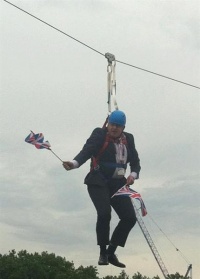 Johnson auditions for The Krypton Factor.
Johnson auditions for The Krypton Factor.
Johnson spends three years on the sidelines – there were no by-elections in Conservative seats during this period. Does he still run for Westminster in 2015? Does he get a peerage and annoy from the ermine benches? Or does he confine himself to journalism and books, and an occasional barnstorming appearance on Have I Got News for You?
Exit, Pursued by T Blair
Our final point of difference comes in April 2004. Tony Blair does a U-turn. After months of saying that parliament is supreme, he suddenly decides, no, there shall be a referendum on the proposed European Constitution.
The Constitution tried to re-write all the EU's treaties, and put them into one document. It also served to clarify the EU's aims and objectives; some of these came as a surprise to the less well-informed members of Blair's party. Blair had lost authority through the war in Iraq, he faced criticism in his own cabinet and a significant test at elections in June.
Blair had also been criticised in public. The press – particularly Murdoch's The Sun and Rothermere's Daily Mail – had been on his back about the "sell-out" and "unelected bureaucrats" and all that nonsense. Boris Johnson's lies from a decade earlier had been believed and amplified by the tabloids, assumed true because it made good copy. Behind closed doors, Murdoch had indicated that his papers would not support Blair at the next general election unless he promised a referendum.
There was a plan for a referendum on the European Constitution, it appeared in Labour's manifesto of 2005. Before the referendum process could happen, voters in France and the Netherlands rejected the Constitution in their own votes. The document was withdrawn.
Most of the clarification appeared as the Treaty of Lisbon. The opposition Conservative party said they would hold a vote before ratifying the treaty, but it came into force before they could be elected. And the stakes were ratcheted up. The Liberal Democrats had offered an in-out referendum in 2005, and the coalition government promised a vote on any treaties giving "new powers" to the EU. An in-out referendum was promised by David Cameron in 2013, and a vote took place last month. Which is where we came in.
Summary: It's Not All Angus Deayton's Fault
So, what do we see as the key turning points?
- Boris Johnson is allowed to make up rubbish as Brussels correspondent.
- Boosts for anti-politics sentiment, particularly Robert Kilroy-Silk in 2004, the expenses revelation in 2009.
- Nigel Farage is able to continue after his plane crash.
- Labour selects Ken Livingstone rather than Oona King.
- Tony Blair is "persuaded" to accept a referendum.
Events did not turn on Angus Deayton remaining host of a topical news panel. This column doesn't believe the past two weeks' lunacy would have been averted if the host was able to read an autocue. There are many stronger claims to have altered the course of history.
But let's back track just a little bit. Why was Angus Deayton sacked? He had slept with someone other than his wife. He had consumed illegal drugs. Immoral, certainly. Unwise, probably. Making Angus someone to laugh at, yes, but wasn't that his job?
Angus hadn't been racist. Angus hadn't beaten any women. Angus hadn't got the public to pay for a duck house. Angus didn't get cash in brown paper envelopes. Angus didn't make up false stories. Angus hadn't abused young girls. By the standards of other people in this article, Angus Deayton was not so bad. Whatever his crimes, they didn't disqualify him from the job.
Someone was out to get him. Someone was running splashes in the newspapers, day after day after day.
Back in 1996, there had been a slanging match across the studio at Have I Got News for You. Matthew Rudd described it thus:
- The decision of Piers Morgan to come on the programme is possibly the worst that has ever been made by a guest. A long time enemy of Hislop, whose magazine had made no secret of their dislike for him as person, journalist and editor, he arrived intent on making life tough for the Private Eye head. Morgan tried jokes as the game wore on, but failed. The audience weren't keen. So he turned to personal insult and childish sneering over the careers of those in the studio with him.
- Eddie Izzard's main contribution to his two episodes had been, in Izzard-esque desperation for a line, his memorable suggestion that "three of them are made of jam!" for an odd-one-out question. Seven days on – "is the answer 'jam' at all?" asked Morgan. "Last week Eddie Izzard said it and you all roared with laughter." "But people like him," replied Hislop. Applause from the audience followed as Morgan grinned, believing he was still the populist's man in the studio.
- "The last time I was rude to you, you sent photographers round to my house," said Anderson. "You won't see them this time," came the grumpy, nasty reply. Hislop was thrilled by the way his enemy was sinking himself lower. "He is charming, isn't he?" he said, mugging to the crowd. "Don't play the popularity card with me, Hislop." "Why?" Morgan turned to the audience. "Do you actually like him? Do you like Ian Hislop?" The affronted crowd shouted "Yes" as one. Morgan shook his head in disbelief that his nemesis was so loved; Hislop shook his head at Morgan's own idiocy. Anderson piped up. "Ian is a regular on this programme and they've come here to see him! They don't care about us!"
The feud went up a level. Morgan wanted to ruin his enemy, and set photographers outside Hislop's home. Morgan wanted to run an exposé of Hislop in his Daily Mirror newspaper, but had only one problem. Hislop is whiter than white. He repels dirt.
Hislop doesn't go around buying shares in companies tipped by Private Eye. Hislop doesn't publish fabricated photographs on his organ's front page and pretend they're true. Hislop is so honest, he takes confessions from his vicar. When he takes the Daz doorstep challenge, Danny Baker asks Ian Hislop how to get things so white.
When you can't get your enemy, you get his co-workers. The campaign against Deayton was led by the Daily Mirror. For five days, Morgan's paper led with manufactured "outrage" against Deayton. It was obvious what was going on, the Mirror was raking muck, finding anyone to say anything bad about the HIGNFY host.
So, here's our final point of departure. Would Angus Deayton have remained in the chair if Piers Morgan hadn't started a vendetta? We think he would. Lorraine Heggessy, the prissy and inept controller of BBC1, had been lukewarm to Deayton, but would have had no compelling reason to sack him. HIGNFY was one of her channel's few reliable successes, and it would have been a strange decision to jeopardise the programme because of a few days' bad press.
Of course, if you believe the "Angus Deayton's departure led to Brexit" theory, then much of the blame must transfer to the person who wheedled him out. The then-editor of the Daily Mirror, has since become a failed CNN chatshow host, a limey campaigner to change American laws, a judge on Britain's Got Talent. And the host of Good Morning Britain on a day when history is made, when we want the host to come up with some words of pathos and instead get the pathetic.
This Week and Next
A few weeks ago, we wondered if a suitably powerful computer (with a suitably clever programmer) could crunch all the games of "Black Hole", from the Game On series. Tom Flynn is the suitably clever programmer, and has analysed that particular game.
The conclusions:
- "Black Hole" will gravitate towards a draw. With good play from both sides, a draw is likely.
- This analysis is more difficult than this column thought: Tom notes that the moves on round 7 took twenty seconds to work through, moves on round 6 would take longer.
- In the broadcast, both players made errors, and the last error cost the game.
- So basically, "Black Hole" is the logical equivalent of "The Red Zone" from Jet Set.
ITV are telling us about the new run of BBC The Voice of This Territory. They've confirmed that will.i.am will sit on one of the chairs. He will also appear on BBC The Voice of This Territory Kids, and Emma Willis will host the junior edition. Sounds like they're making it a proper parallel junior programme, not a half-hearted spin-off show; we approve.
Over at The Xtra Factor, they welcome Rylan Clark-Neal. The 2013 contestant will host the spin-off programme, just as he hosts Big Brother's Bit on the Side.
On the BBC, there will be two specials of The Great Christmas Bake Off. The special shows bring back former contestants, just for lawks. These two special programmes replace the Bake Off Masterclasses from previous years. Are we to assume that Mary and Paul have given the final word on Christmas cake?
A fine episode of Blue Peter this week, where they adopted the format of A Question of Sport. Once again, Lindsey Russell proved to be a fine host, holding the live show together and making it look easy.
BARB ratings in the week to 26 June.
- Top show was Euro 96 Roy Hodgson's Team versus Ján Kozák's Repre, seen by 10.25m on ITV-SD+HD. Most popular game show was Pointless Celebrities, 4.05m saw the show on Saturday evening.
- The Great British Sewing Bee was hit by the sportsball, and fell to 2.85m viewers. The Chase took third place, with 2.5m on Thursday.
- Mock the Week was out of date even before its transmission on Thursday, seen by 1.6m. Big Brother brought 1.5m to Channel 5 on Wednesday, Love Island had 1.45m on ITV2 Thursday.
- Pointless returned to BBC2 for a couple of days, with 1.2m viewers. Bargain Hunt shuffled across on Friday, just 850,000 viewers.
- Taskmaster came back, a stonking 550,000 on Dave. America's Next Top Model brought 260,000 to UK Living.
The sportsball ends tonight, normal game show competition returns. And how! University Challenge and Only Connect (2) make the "quizzy Monday" hour on BBC2. Mastermind has a new slot, BBC2 on Wednesday evening. Over on Channel 4 daytime, The Question Jury promises quiz and argument, because that always works.
Elsewhere, some imports. Masterchef Junior (W, weeknights), Rupaul's Drag Race All Stars (TruTV, Mon). Sue Barker begins new episodes of A Question of Sport (BBC1, Wed). The live final of Love Island (ITV2, Mon) and Big Brother (C5) promises "Annihilation week".
Photo credits: ITV Breakfast Broadcasting, Hat Trick, Stephen Lock, Spun Gold TV.
To have Weaver's Week emailed to you on publication day, receive our exclusive TV roundup of the game shows in the week ahead, and chat to other ukgameshows.com readers, sign up to our Yahoo! Group.

